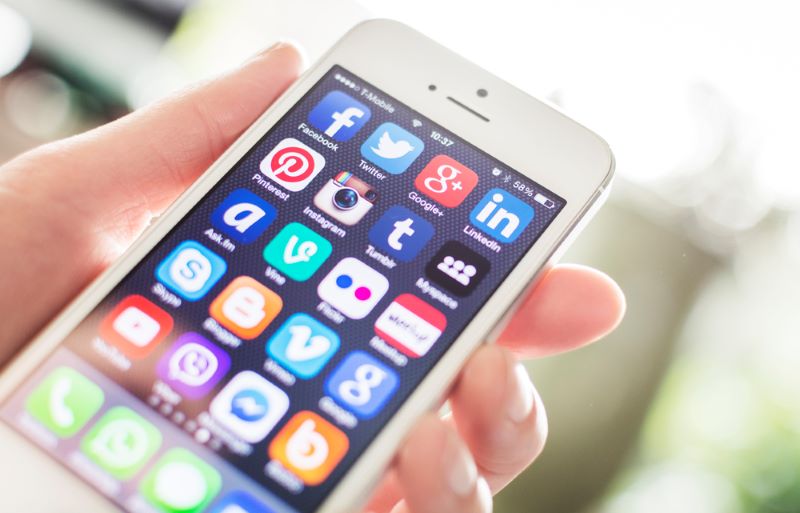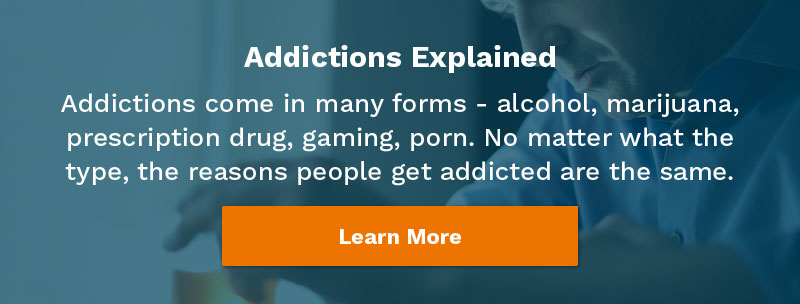
6 Min Read
Contents
- What Is Social Media Addiction?
- Why Social Media Is So Addictive
- What Addiction To Social Media Does To A Relationship
- What You Can Do About Social Media Addiction
Does anyone really use their smartphone as a phone anymore? People stare at their smartphones infinitely more than they talk on them. In fact, using apps, particularly those for social media, is one of the top uses of smartphones. Which is why how we use our phones is one of the top signs of social media addiction.
We all know someone (or a lot of someones) who can’t be separated from their phone -- and it’s not because they’re waiting for an important call. It’s most often because of social media. So when does using social media become an addiction?
“Every night after the kids go down she’s on her phone for hours.”
“He won’t even put it down when I’m talking to him.”
“We can’t talk without being constantly interrupted by the beeping.”
What are all of these partners doing? Most are looking at social media. All those people walking around with their heads down staring at their phones? Yep, most of them are on social media. A guy told me this week that the neck and shoulder pain he currently has is from using his phone so much. It’s no wonder why a lot of people look like social media addicts.
What Is Social Media Addiction?
We all know what social media is and most of us are on it. Facebook, Instagram, YouTube, Twitter, WhatsApp, Tik Tok, the list goes on and on as these platforms have become a part of daily life for most people. In fact, look at this research on the top ways people use their phones now:
- Texting (88% use this)
- Email (70%)
- Facebook (62%)
- Camera (61%)
- Reading news (58%)
- Online shopping (56%)
- Checking the weather (54%)
- WhatsApp (51%)
- Banking (45%)
- Watching videos on YouTube (42%)
3 of the top 10 are social media sites and several of the other activities are often done on social media.
It’s possible for any behavior to become addictive. An addiction is simply a behavior that is harmful and has a consistent recurring pattern. This doesn’t have to mean daily use, however. I’ve treated alcoholics who don’t drink every day, yet they’re often obsessed with drinking, depend on drinking to get through life, and believe they can’t go without it. Sounds a little like how some people treat social media?
Some common characteristics of addiction are:
- Obsession
- Compulsive Use
- Increased Tolerance (resulting in needing more to produce the same effect)
- Dependence
- Inability to Stop
- Continuing Use (despite negative effects such as relationship problems)
- Withdrawal symptoms
This list typically describes an addiction to alcohol or a drug. But don’t these also describe how some people are with social media?
It’s estimated that 10% of the population of the United States has a social media addiction and this estimate is likely too low. The appeal of social media combined with the always available access we have on our smartphones has turned a lot of people into social media addicts.
Why is my husband trolling online Facebook and Instagram women? "-Chelsea
Why Social Media Is So Addictive
One of the unique things about social media, as well as smartphone use, is that typical use can easily look like an addiction when it isn’t necessarily. Yet the opposite is true as well in that what can be viewed as just typical social media use is actually a social media addiction.
So what are some of the things that make social media so addictive?
- Allows us to learn what others are doing. While it can be argued that social media has just taken the place of what people used to do in-person or by talking on the phone, it can become so much more. Because of the visual element social media offers it can actually be a bit voyeuristic.
- Provides a quick and easy escape from the stress of life.
- Gives us a voice and influence on others that we don’t otherwise have (and really shouldn’t).
- Ability to get acceptance from others outside our relationship or family, which can take the place of our partner, kids or others that are close to us.
- Makes us feel connected and not so alone.
- Always available, changing, and new.
- Releases pleasure chemicals in our brain that make us feel good (temporarily).
Research on the effects of social media use is increasingly showing it can also contribute to feeling depressed, anxious, and lonely, which can lead to self-harm and suicidal thoughts. It can also create or further feed pre-existing beliefs about your life or appearance being inadequate, as well as fears of missing out (FOMO).
This is very weird. We have been married for 2.5 years. I have never doubted my wife. However recently she went to her home town and while returning she met a person whom she talked all the way and she said she is flirting to pass time on a train. I was okay thinking that she was time passing. Then I saw some changes in her habit. Earlier she was not at all on any of the social media. Now suddenly she is addicted to Facebook and started chatting with that person on WhatsApp in front of me, mostly for 2-3 hours average. Some of the content she showed what they have been talking. Just normal friendly talk however whenever she gets time after work she is continuously chatting with him. I was wondering should I be worried? For now I am feeling bad as she is giving more time talking to him than me." -Fareed
What Addiction To Social Media Does To A Relationship
In couples counseling the use of phones and social media comes up all of the time as a complaint. Here are 4 negative effects an addiction to social media has on partners and relationships:
- Impedes Communication. When we’re distracted and engrossed in Facebook or Instagram we’re not fully present for our partner. Here are a few things that are commonly said:
“You don’t listen to me”
“You never hear me”
“You don’t remember the things I say to you”
- Causes Division and Separation. There are a lot of things about daily life that pulls partners apart – work, kids, household responsibilities, etc. And social media can become another thing that causes separation and lack of connection.
“You’re always on Instagram.”
- Creates a Barrier. When we’re communicating with others on social media your attention and interest is elsewhere. Loved ones feel this – and not just partners either.
“The kids feel like your phone is more important to you than them.”
- Fuels Distrust. Because social media is an individual activity and is about connecting with others, suspicion and distrust often develops between partners.
“I don’t trust who you’re friending on Facebook.”
These quotes are all statements I’ve heard partners say to the other about social media.
My boyfriend is addicted to Facebook. He told me that he has talked to this girl every day for two years, but he said they were just friends. At one point during our relationship he was talking to her non-stop – we’d be snuggled on the sofa and he’d have his phone in his hand messaging away with her. We’d be at dinner and he’d be sending her pictures of dinner. I asked him to stop talking to her while he was with me – to BE with me when he’s with me. It still upsets me that they talk. I feel like he already crossed a line with her and I don’t know how you come back from that. Every time I see a message from her pop up on his phone or see him like one of her photos on Instagram, I get a knot in my stomach. It makes me physically ill. I tell him this, he knows it, but what’s he supposed to do? He thinks I’m unreasonable and maybe I am. But I don’t know how to be ok with this. I’m not ok with it. It’s been a year and I’m still not ok with it." -Marcy
What You Can Do About Social Media Addiction
Addictive behavior is hard to stop. It typically takes the help of an experienced counselor to learn how to change it. But here are the 3 main steps to ending an addiction. I will say these are much easier said than done.
- Admit it. Acknowledge to yourself that you use of social media is too much and causing a negative impact on your life.
- Identify why you do it so much. This one is a harder to do on your own as the reasons will have a psychological component that can be hard for the untrained eye to recognize.
- Develop new routines. You’ll need to replace your dependence upon social media with healthier, less destructive alternatives. As I said earlier, easier said than done when almost everyone is on it so much, but it is possible.
Social media in and of itself isn’t bad. Just like alcohol isn’t bad. How we use each one, how much we use them, and the reasons we do so are the things that can make them bad for us. Since social media, just like alcohol, is so accepted in our society it can be hard to recognize when it’s become a problem. Nevertheless, social media addiction is a real problem a lot of people have and don’t realize it.
Know someone who acts like they’re addicted to social media? Please share with other readers what other signs you see.
Looking for More? Check Out These Articles
- I Think My Husband Is Having An Emotional Affair
- My Wife Is Passive-Aggressive And I Don't Know How To Deal With It
- I Think I Resent My Husband And It's Causing Big Problems
- Get More Help with Addictions
































Comments
Currently, there are no comments. Be the first to post one!